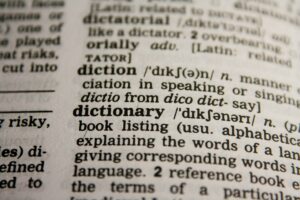Yin Liu
Myth: English is written using the English alphabet.
 There is no English alphabet. English is a language, not a writing system. It can be represented in writing in many different ways: by using an alphabet, by using Morse Code, by Braille, whatever you wish. Most commonly today, it is written using the Roman alphabet, which was originally designed to write Latin. There has been no commonly used writing system specifically designed to write English.
There is no English alphabet. English is a language, not a writing system. It can be represented in writing in many different ways: by using an alphabet, by using Morse Code, by Braille, whatever you wish. Most commonly today, it is written using the Roman alphabet, which was originally designed to write Latin. There has been no commonly used writing system specifically designed to write English.
Behind the inaccurate phrase ‘the English alphabet’ is the misconception that there is a one-to-one correspondence between a spoken language and a written representation of that language. Reality is more complicated. A language can be written using more than one writing system; for example, Serbo-Croatian is, grammatically, essentially one language, but when it’s considered ‘Croatian’ it’s written with the Roman alphabet, and when it’s considered ‘Serbian’ it’s written with the Cyrillic alphabet. Conversely, a writing system can be used to write many different languages; for example, written Chinese is used to represent all the distinct and often mutually unintelligible Chinese languages (often called ‘dialects’ of Chinese), as well as being adapted to represent some words (kanji) in written Japanese.
At one point in its history, two possible alphabets were used for English: the runic alphabet, the futhorc, designed for Germanic languages such as English, and the Roman alphabet, designed to write Latin and adapted to write English. On the left is a detail from Oxford, St John’s College MS 17, fol. 5v. The manuscript was created in England circa 1110 and is mostly devoted to computus, the art of astronomical and calendrical calculation, but on this page is a chart of cryptic and esoteric alphabets. These two rows show symbols (graphemes) from the runic futhorc on the left and corresponding letters from the Roman alphabet on the right. By the time this manuscript was created, the Roman alphabet was the usual way of writing both Latin and English, and the runic alphabet was an oddity that not many people in England knew how to use.
The Roman alphabet is used today, with minor variations, to write a great number of different languages, many of which are not even related to each other. English is just one of them.
Click here to read more







